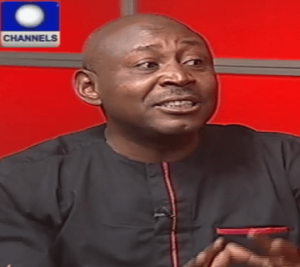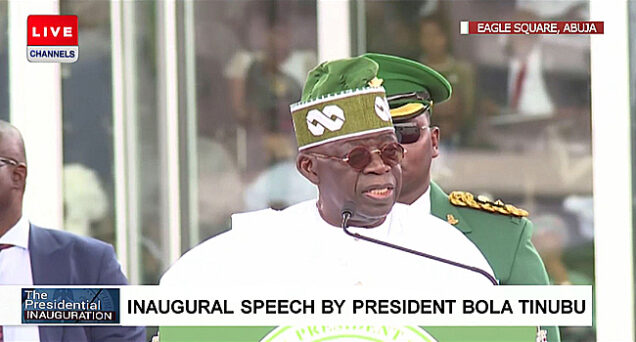
By Fred Edoreh
I would like to make clear, outright, that I am all for the removal of fuel subsidy, but also that I despise the political manipulation of the people as has become our experience with the APC as a political party and the presidencies of Muhammadu Buhari and Bola Ahmed Tinubu.
In 2012, President Goodluck Jonathan moved to remove petroleum subsidy, pointing at its drain on national revenue and the huge corruption in the payment system.

In reaction against the policy, Bola Ahmed Tinubu, Muhammadu Buhari, Wole Soyinka, Pastor Tunde Bakare and others, organised and stormed major towns and cities with crippling protests and propaganda.
In a statement signed by Tinubu himself and titled: “Removal of Oil Subsidy – President Jonathan breaks social contract with the people,” he accused the him of betraying the people by the sudden removal.
Berating Jonathan, he said, in his very words: “The people now pay a stiff tax for voting him into office.”
As reported by PM News of January 11, 2012, Tinubu argued that if subsidy must be removed at all, it must never be at one fell swoop. Rather it must be on calibrated phrases, on which the promised gains are measured and confirmed before moving to the next phase of removal.
“Government must modify the sudden and complete removal of the subsidy. Either we restore the subsidy or use the funds for other social purposes. It all depends on what and who in society government would rather favour. If we are to use the funds for other programmes, these programmes shall be placed on parallel track with the subsidy. As more of these programmes are ready to go on line, then the subsidy can be lifted in phases. In this way, the public is assured government will not lower its total expenditure on their behalf, thus maintaining the spirit central to the social contract,” he expatiated.
Charging up the protesters to ride on, he blirted more scathing words on Jonathan:
“The Jonathan tax,” as he described the subsidy removal, “represents a new standard in elitism. Because he is slave to wrong-headed economics, the people will become enslaved to greater misery. This crisis will bear his name and will be his legacy. The situation shows that ideas count more than personalities. People may occupy office but how that person performs depends on the ideas that occupy his mind.”
Those were Tinubu’s words 11 years ago and, in the heat of the propaganda attacks and raging civil disobedience, the government retreated on the policy to avoid total breakdown of law and order, and the nation lost the opportunity of timeously hemming in the debilitating subsidy which progressively galloped from about N400b to N1.5 trillion and now to over N6 trillion per annum as shown in the 2022-2023 budget.
Consequent upon their brashly unreasoned and politically self-serving disinformation and actions, the nation has misapplied about N50 trillion, on the average, on the wasteful petroleum subsidy between that 2012 and now.
Today, Tinubu is President of Nigeria and at his inauguration on May 29, he summarily declared that petroleum subsidy would be fully and completely abolished by June 30, just here.
Before the conclusion of the inauguration, the market began to react. Across the country, pump prices immediately rocketed to between N500 and N1000 per litre due to panic buying and the tendency for marketers to hoard products to position their trade ahead, being unsure of what to expect.
Pitifully, the burden is now on State Governors, now confronted on their first day in office after their own inauguration, to start running about town to restrain excessive market reaction to protect consumers.
So, in Tinubu’s words, “the people are now paying a stiff tax for voting him into office.” Should we also call this “Tinubu’s tax” and “wrong-headed economics”?
It was the same affliction when Buhari returned to power. After speaking so sanctimoniously about lowering pump price, he immediately moved it from N87 to N145 and up up it went throughout his tenure.
The problem with the APC is that it is deeply principled on rhetorics, propaganda and deception of the people. They are heavy in words but terribly deficient in performance. Such political manipulation of the people is anathema to social credibility and sustainable development because it baggers public trust.
To be clear, the removal of subsidy is something we must do but responsible leadership must demonstrate integrity it words and action, and not talk without first acquainting itself with the facts of a situation Buhari and Tinubu have jointly and severally done with the subsidy question.
For instance, as Tinubu proposed in 2012, “it (the removal) must be on calibrated phrases, on which the promised gains are measured and confirmed before moving to the next phase of removal,” but where now is the calibration, the measuring, the confirmation and the phasing before his declaration on inauguration day?
In his notes on the 2022 Appropriation Bill, Buhari also said the same thing:
“As a country, we must now confront this issue taking cognizance of the need to provide safety nets to cushion the attendant effects on some segments of society,” he said.
Where now is the safety nets and the cushion ahead of the removal?
Another dimension worthy of exploration in the matter is Tinubu’s declaration that there is no provision for subsidy in the 2023 Appropriation Act.
This may seem to be true even though the former Minister of Finance, Zainab Ahmad had disclosed that in the 2023 fiscal period, the government made provisions of N3.36 trillion Naira for fuel subsidy payment but to cover only the first six months of this year. Thus, it tallies with the June date pronounced by Tinubu.
However, it should be noted that the 2022 Appropriation Act was extended by the National Assembly to June 2023 following a bill presented by Senate Leader Ibrahim Gobir.
“You will recall that the National Assembly extended the implementation of the 2022 Appropriation Act from 31st December 2022 to 31st March 2023. This was to allow full implementation of the budget, especially in the light of the 2022 Supplementary budget approved in December 2022 the extension had allowed MDAs to utilize a large proportion of funds released to them. However, significant amounts of funds remain with MDAs and will require a further extension to be fully expended. Giving the critical importance of some key projects nearing completion, requesting a further extension of the expiration clause in the Appropriation (Amendment) Act, 2022 and the Long Title and Explanatory Memorandum of the Supplementary Appropriation Act is expedient…,” he explained on the occasion.
Accordingly, the amendment and implementation of the 2022 budget was extended till June 2023.
Given this scenario, what now happens to the over N4 trillion provision for fuel subsidy in the 2022 budget, the further provision for same in the 2022 Supplementary Budget and the provision of N3.36 trillion in the 2023 Budget, all existing together?
Most critical, however, is that while in eight years, the APC did not address the national refineries as Buhari had promised, they are even now removing the subsidy without the calibration, the measuring, the confirmation, the phasing, the safety nets and the cushioning for the people pontificated about.
It even more curious that governments would deny the economic shock they create by their actions and proclamations to put the blame of market reactions on ordinary people struggling to survive the “wrong-headed economics” of their leaders.




GIPHY App Key not set. Please check settings